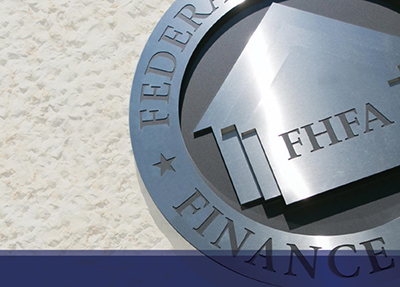
FHFA, Ginnie Mae Update Capital, Liquidity, Net Worth Requirements for Seller/Servicers, Issuers

The Federal Housing Finance Agency and Ginnie Mae on Wednesday updated minimum financial eligibility requirements for seller/servicers and issuers.
FHFA and Ginnie Mae jointly released their long-awaited finalized capital, liquidity and net worth requirements for sellers and servicers of loans backed by Fannie Mae and Freddie Mac and Ginnie Mae issuers. These requirements largely would apply to IMB servicers, with certain additional requirements being placed on large servicers – those with servicing portfolios greater than $50 billion.
The final standards incorporate numerous key MBA recommendations including:
- Allowing 50% of the unused portion of committed agency servicing advance lines of credit to count toward the liquidity calculation (up from the proposed zero);
- Reducing the origination liquidity requirement significantly, and exempting from it smaller lenders with less $1 billion in origination;
- Aligning baseline standards and recognizing the differences in remittance type (lower requirements on actual remittance compared to scheduled);
- Eliminating the pro-cyclical non-performing loan liquidity “kicker”;
- Limiting the need for liquidity buffers to large institutions, and allowing the buffers to be accessed without prior permission from the GSEs;
- Aligning base capital requirements for both FHFA and Ginnie at 6%, down from FHFA’s proposal of 9%;
- Aligning net worth requirements at $2.5 million plus 25 bps for enterprise and PLS/Other servicing and 35 bps for Ginnie servicing; and
- Extending the proposed 6-month implementation timeline for these requirements to September 30, 2023, for most requirements and longer for certain others.
Ginnie Mae did not eliminate its risk-based capital requirement as MBA urged, but did lower the standard from 10% to 6%.
For a more detailed summary of the proposal, including how it compares to existing requirements and prior proposals, click here.
- Why it matters: These requirements play a substantial role in the financial planning and risk management practices of seller/servicers and issuers. MBA has long acknowledged the importance of ensuring resiliency and stability, while also noting the need for any such requirements to be tailored appropriately to the risks presented in the market. In prior comments to FHFA and Ginnie Mae, we have highlighted concerns with counterproductive incentives, procyclical requirements that exacerbate liquidity in stressed markets, and excessive liquidity requirements that could undermine market stability rather than strengthen it. Each of these points was acknowledged and reflected in the updated proposal.
- What’s next: Significant additional analysis will be needed to fully assess the impact on the IMB sector and the housing finance market broadly. We will continue work with our members and FHFA, Ginnie Mae, and the GSEs to refine these standards and to address any questions or issues that arise during implementation.
“Prompted by the changing nature of the U.S. housing finance system, these enhanced eligibility requirements reflect Ginnie Mae’s and FHFA’s shared goals to promote confidence in approved issuers and seller/servicers and improve the safety and soundness of the U.S. mortgage-backed securities ecosystem through all economic cycles,” FHFA and Ginnie Mae said in a joint statement.
“The updated eligibility requirements represent an ongoing commitment to the safety and soundness of Fannie Mae and Freddie Mac by strengthening the capacity of seller/servicers to meet the financial responsibilities associated with doing business with the Enterprises,” said FHFA Director Sandra L. Thompson. “FHFA and Ginnie Mae’s effort to coordinate on financial eligibility requirements provides greater consistency for Enterprise seller/servicers and Ginnie Mae issuers.”
Ginnie Mae President Alanna McCargo said ensuring Ginnie Mae issuers can acquire financing during times of stress is critical to preserving access to credit for borrowers who depend on Ginnie Mae and its insuring agency partners. She said the new requirements will promote the resilience of Ginnie Mae’s issuers and better enable them to operate throughout economic cycles.
Mortgage Bankers Association President and CEO Bob Broeksmit, CMB, noted the proposal reflects a significant amount of MBA’s feedback to the existing and previously proposed rules. “We are pleased that FHFA will now allow a significant portion of the unused committed agency servicing advance lines of credit to count toward the liquidity requirements,” he said. “In addition, the agencies significantly reduced and recalibrated the ‘origination liquidity’ requirements to better reflect expected margin call risk.”
Importantly, Broeksmit said, FHFA and Ginnie Mae also extended the implementation timeline to provide servicers sufficient runway to adjust to the new requirements. “Other proposed changes that MBA had supported during the comment phase were also preserved in the final rule, including eliminating the procyclical liquidity requirement for nonperforming loans and recognizing differences in remittance types,” he said. “We appreciate that FHFA and Ginnie Mae will align most, although not all, of their standards. Additional analysis will be needed to fully assess the impact, and we will work with FHFA and Ginnie Mae to ensure the requirements are properly calibrated.”
Broeksmit said these requirements play a “substantial role” in the financial planning and risk management practices of institutions that originate and service GSE- and Ginnie Mae-backed loans. “MBA has long acknowledged the importance of ensuring stability and resiliency in the mortgage sector, while also noting the need for any such requirements to be tailored appropriately to the risks presented in the market,” he said. “We look forward to continuing to work with our members and FHFA, Ginnie Mae and the GSEs on any questions or issues that arise during implementation of these new guidelines to ensure that our mortgage system remains safe and sound and that affordable, sustainable mortgage credit remains available for all qualified borrowers.”
Click here for a side-by-side comparison of enterprise and GNMA requirements
FHFA and Ginnie Mae said most of the requirements become effective on September 30, 2023.
For more information, contact Pete Mills at (202) 557-2878 or Sasha Hewlett at (202) 557-2805
